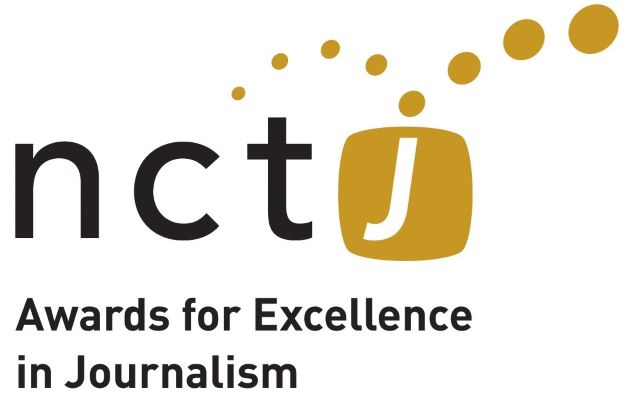Categories
Find out more about each of the Awards for Excellence categories.
Student and trainee/apprentice award categories
These categories are open to NCTJ students, trainees and apprentices. See our Rules of Entry for eligibility criteria.
News journalism award
This award will go to the student/trainee/apprentice journalist who has demonstrated all-round qualities in news gathering and reporting. The judges will consider a number of elements including the work that went into getting the story, the number of sources used and reader/audience interest in the news.
Entrants should submit three reports (in print, broadcast and/or online format) to illustrate their qualities as a journalist, plus a supporting statement explaining the significance of each report (no more than 200 words in total for all three stories).
In choosing the winners, the judges will consider:
- Style of writing/delivery
- Story construction and structure
- Good use of quotes/clips
- Human interest potential
- Public service/audience value
- Evidence of in-depth interview techniques
- The range and variety of stories submitted
Sports journalism award
This award will go to the student/trainee/apprentice journalist who can demonstrate an all-round knowledge of sports journalism.
The award will go to the entrant who has delivered more than a standard after-match analysis from the team manager and who has shown a willingness to ask revealing questions and developed the story.
Entrants should submit three reports (in print, broadcast and/or online), along with a supporting statement explaining the significance of each report (no more than 200 words in total for all three reports). Ideally, one should be a backgrounder, feature or profile piece.
The judges will consider a number of elements including the work that went into getting the story, the number of sources used and reader/audience interest in the copy. In choosing the winners, the judges will consider:
- Style of writing/delivery
- Story construction and structure
- Good use of quotes/clips
- Human interest potential
- Evidence of strong sporting knowledge
- Evidence of in-depth interview techniques
- The range and variety of sports stories submitted
Top scoop award
This award will go to the single story (in print, broadcast and/or online), picture or video produced by a student/trainee journalist which, in the opinion of the judges, is the scoop of the year.
Entrants should submit their chosen story/image/video plus a supporting statement explaining the work that went into landing the scoop and details of its significance (no more than 200 words).
Judges will consider a range of elements, including:
- Audience interest in the story or image
- Evidence of how the scoop was obtained
- Content
- Style of writing / delivery
- Human interest potential
- Public service value
Features award
This award will identify the best student/trainee/apprentice feature journalist. Judges will be looking for a feature or news backgrounder (not an over-written news story) that gets to the heart of an issue and is well written or produced.
Entrants should submit two features (written or broadcast) and a supporting statement of no more than 200 words explaining the significance of both.
Judges will consider a range of elements, including:
- Style of writing/delivery
- Construction and structure
- Human interest potential
- Public service/audience value
- Originality
- Content
- Evidence of research and in-depth interview techniques
Podcast journalism award
This award will identify the best student/trainee/apprentice journalism podcast. Judges will be looking for a podcast that gets to the heart of an issue and is well produced.
Entrants should submit one episode and a supporting statement of no more than 200 words explaining the significance of the podcast.
The podcast can be created by more than one person and can be submitted as a joint enterprise or project.
Judges will consider a range of elements, including:
- Style of delivery
- Construction and structure
- Human interest potential
- Originality
- Content
- Evidence of in-depth interview techniques
Data journalism award
This award will recognise the skills in visualising data, reporting stories from data sets and Freedom of Information requests and developing human interest angles.
Entrants should submit one piece of data journalism and a supporting statement of no more than 200 words explaining the significance of the work.
Judges will consider a range of elements, including:
- Style of writing/delivery
- Construction and structure
- Human interest potential
- Public service/audience value
- Visualisation of data
- Depth of investigation and interrogation of data
- Originality
Specialist award categories
These categories are open for entries and nominations from training providers, journalists and employers. See below for entry requirements in each category.
Student project of the year award
This category is for the best student project (newspaper, magazine, website, broadcast package) submitted by accredited course providers or distance learners studying the Diploma in Journalism.
In choosing the winning publication, judges will consider:
- innovative and original ideas
- quality content and presentation
- student involvement
- the level of reader/user engagement it provides
Course providers should submit their nomination using our specialist award entry form. The entry must include a supporting statement of no more than 400 words that should explain:
- how the project came about
- the key aims of the project
- the level of success achieved
- the facts and figures setting out the numbers of students involved
Equality, diversity and inclusion award, sponsored by the Financial Times
 This award, sponsored by the Financial Times, recognises the outstanding work of individuals, educators and trainers, and employers who promote equality, diversity and inclusion in the media and training sector.
This award, sponsored by the Financial Times, recognises the outstanding work of individuals, educators and trainers, and employers who promote equality, diversity and inclusion in the media and training sector.
This award can highlight any form of diversity and inclusion. Nominations can be for:
- individuals who have created a diverse and inclusive work environment by inspiring and motivating others to achieve outstanding success
- education and training providers that have been proactive through outreach programmes and unique initiatives that have made a difference and supported an inclusive and engaging environment
- employers and media organisations that have championed diversity and promoted inclusion within their own workforce and/or for the industry
Entrants should provide a brief description of why the nominee is worthy of recognition and can nominate themselves or others.
The judges will look for evidence of success in making a measurable difference to diversity in journalism. They will consider the following in the shortlisting process and in making their choice of winner:
- inventiveness, inspiration, commitment and motivation
- impactful initiatives that demonstrate a sustained change in the workplace or industry
- significant benefits or results on any scale
Innovation of the year award
In times of great change in the media industry, this award aims to encourage and recognise innovation in journalism education and training.
The award is part of the NCTJ’s ambitious strategy to change and enhance the industry’s long-established accreditation scheme and the way the charity and employers work together with the best universities, colleges and independent providers in the UK.
The Innovation of the Year Award recognises the unique contribution NCTJ centres make to the education and training of journalists on accredited courses. It is open to centres that have improved upon – or extended beyond – current expectations of best practice in education and training.
Entries can cover any new education and/or training initiative relating to journalism training and education (for example, a new approach to teaching and learning, curriculum development, apprenticeships, diversity, skills, digital developments, regulation and ethics, professional development or strategy).
Entrants should provide brief descriptions (no more than 250 words per section) of their innovations under the following headings:
-
Aims and objectives of the innovation
-
An overview of the innovation and why it was pioneering or ground breaking during the year to make it worthy of this award
-
The leader of the innovation and other team members, if any, involved
-
The challenges that had to be overcome for successful implementation
-
The achievements or improvements made
-
Benefits and any positive impact on staff and/or students
The judges will look for evidence of how the innovation has been developed and applied to improve performance, operational effectiveness or learners’ experience, and brought something new to journalism education and training. They will consider the following in the shortlisting process and in making their choice of the winner:
- Originality
- Improvements in best practice
- Significant benefits or impacts
Apprentice of the year award
The apprentice of the year award will be presented to a nominated individual who was on an NCTJ journalism apprenticeship scheme at any time between September 2020 and August 2021.
Nominations are invited from the apprentices’ employers and tutors, in no more than 500 words, describing why the individual is worthy of the award. Nominations should include a description of outstanding professional progress, practical application, a positive approach to employment and training, and excellent personal qualities.
Community News Project award
Sponsored by Meta, this award seeks to recognise the exceptional work done by community reporters recruited by the Community News Project.
A partnership between the NCTJ, Meta and regional publishers, the project was launched in 2019. It has enabled the hiring of 83 trainee reporters to focus on community news coverage.
Entrants should submit two pieces of published journalism (audio or video entries are permitted), with a supporting statement explaining the significance of their work (200 words max).
In choosing the winner, judges will consider:
- The degree to which the work engages relevant community issues
- The quality and impact of reporting
- Evidence of a range of journalistic skills
- Evidence of multi-sourcing
- Human interest potential
*Please note – to enter you must be a community reporter recruited as part of the Community News Project*
Chairman's award
The chairman’s award celebrates a nominated individual’s outstanding contribution to high standards of journalism training.
Nominations are invited, in no more than 500 words, describing why the individual is worthy of this award. He or she could be an editor, a tutor or anyone who has made a meaningful impact on the training of journalists.
Have a question?
